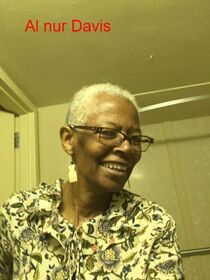|
9/3/2020 2 Comments A medical ERROR? Update: It is with heartfelt sadness, that I report that Al nur Davis departed this earth on February 7th 2021, after I wrote the article below. Her death was not caused by the acid reflux, however, she developed COPD which made it harder for her body to fight the COVID-19 virus. A burp, a gassy feeling in your stomach or a burning sensation in your chest after eating? These symptoms could be from a simple case of binging on beans or they could be an indicator of something more serious. Like many of you, I’ve suffered through the bloat and gas after having a plate of pinto beans with a large piece of cornbread. However, I think we can all agree that overindulging on anything is not good for us. The symptoms I have described should not be ignored if they persist. So please bypass the Zantac when a friendly hand offers it. In this article, I am going to tell you Alnur Davis’ story. It could be yours so read it carefully. I became familiar with her story several years ago after she mentioned her choking episodes. These episodes often came upon her quickly without warning and she could not breathe. She feared that one day she would not recover from it. Her doctor diagnosed her as having Acid Reflux.” Gastroesophageal Reflux Disease (GERD). While I empathized with her condition, I didn’t realize the extent of it until I witnessed it firsthand. It occurred during a sewing gathering with a few friends. We were both in a jovial mood pinning fabric, talking and laughing when suddenly she clutched her chest. Her brown eyes pooled with tears and looked at me with a plea for help. “What’s wrong?” I asked. She could not speak. I feared she was having a heart attack. “Get her a glass of water,” I shouted to the host. I prayed that the water would result in a fix. She held the glass of water tightly and swallowed a few sips. Within a few minutes, her face relaxed and a smile appeared. I breathed a sigh of relief. She had survived the bout. However, I was no longer at ease. I could not get the frightening scene out of my mind. “Lord help her,” I thought. “This is the choking problem I was telling you about, “she said. I wanted to hug her and tell her that everything was going to be alright. However, truthfully, I didn’t know that it would. Something had to be done. “What if she is driving alone and an episode occurs?” I thought. After pondering my thoughts for a few minutes, I looked at her and said, “you are allergic to dairy.” I had no factual knowledge that this was the case and didn’t know why I passionately believed it. “Are you willing to give up cheese? “Yes, I’ll try it,” she said. Give up cheese I thought? Never. She and I both loved us some macaroni and cheese and she also liked ice cream. Several weeks later, Alnur telephoned me. “I gave up the cheese and dairy products and my symptoms are gone. No more choking spells.” I was amazed. Could it have been just that simple? “What did your doctor say when you told her you had a cheese allergy and not Acid Reflux?” I asked. “Oh, she didn’t say much except, “That’s good.” What I later learned is that Alnur’s doctor did not err in her diagnosis as I originally thought. She did have Acid Reflux, but the root cause of her reflux was her allergy to dairy products. Once she eliminated the dairy products, her Acid-Reflux and choking went away. However, if she ate one little ole piece of cheese the choking returned. Our bodies and our diet must come into agreement. If they do not illnesses occur. The root cause of reflux disease, in most cases, can be traced back to diet and or lifestyle. Another reflux condition that many people are not aware of is “Silent Reflux,” Laryngopharyngeal (LPR). What are the symptoms of Silent Reflux? Hoarseness, chronic cough, throat-clearing, post-nasal drip, sinusitis, sore or burning throat, difficulty swallowing, shortness of breath, snoring, sleep apnea, bad breath, tooth decay. Silent Reflux can also mimic asthma like symptoms, and result in COPD. (You need not have all of the symptoms listed). Although silent, this condition can be just as destructive to the body as (GERD) because many doctors are not able to detect it. Most doctors specialize in specific parts of the body. If a medical condition falls within more than one body specialization, your condition might be missed. So instead of going to a doctor with one specialization such as the ears, nose and throat or digestive tract, or lungs, you might want to consider going to a doctor who specializes in Aerodigestive Medicine, if you have the listed symptoms. These doctors take an overall approach to several parts of the body that intersect with the digestive system. Today, Alnur takes no acid reflux medicine. Like many other seniors, she is facing other health challenges and managing them one day at a time. Oftentimes, we are placed in situations at specific times in our lives to be a witness. When I look back at my experience with Alnur's choking, I realized that God used my voice to help her reexamine her use of diary products. God gives each of us the ability to listen to our inner voices. We must all play a role in securing our health. We can not sit on the sidelines. We must ask questions so that we will know what we are being prescribed, why we are being prescribed, what are the side effects, and how long we must take the medicine. Also, there must be a follow-up. There is a possibility that your medication can be eliminated or reduced. Could your diet, lifestyle, or food allergies be the culprit of your health issues? While Alnur’s doctor did not err in her diagnosis, I would be remiss if I did not say that medical errors occur regularly. The Institute of Medicine (IOM) defines an error in medicine to be the “failure of a planned action to be completed as intended (i.e., an error of execution) and the use of a wrong plan to achieve an aim (i.e., an error of planning) [commission]” (IOM, 2004, p. 30). The definition also recognizes the failure of an unplanned action that should have been completed (omission) as an error (IOM, 2004). The IOM report “To Err Is Human: Building a Safer Health System,” distinguished among four types of errors: diagnostic, treatment, preventive, and other (see Box 3-1). An adverse event is “an event that results in unintended harm to the patient by an act of commission or omission rather than by the underlying disease or condition of the patient” (IOM, 2004, p. 32). Thank you for reading this article. I look forward to bringing you more articles in the future. Until then, stay involved and healthy. Written by Patricia Crews
2 Comments
Clara Mae Carter
9/9/2020 06:20:28 pm
Very informative. It pays to be aware of our health needs.
Reply
9/12/2020 03:01:57 pm
Pat,
Reply
Leave a Reply. |
Archives
September 2020
Categories |


 RSS Feed
RSS Feed